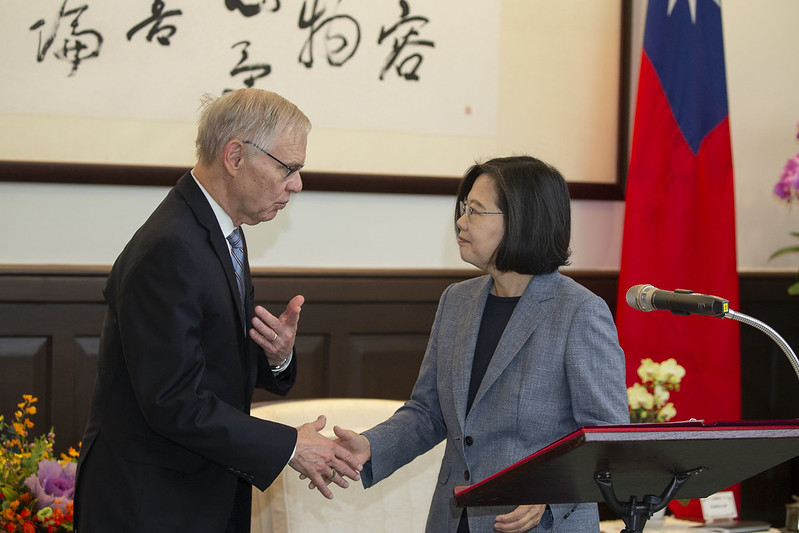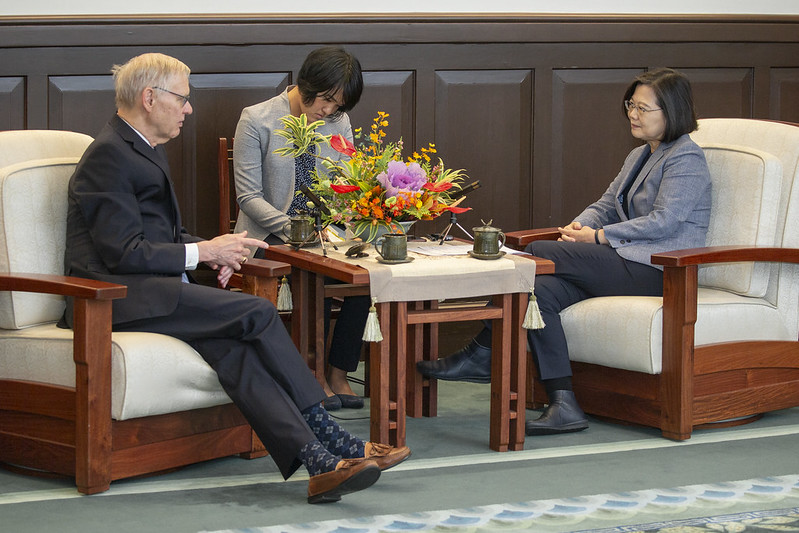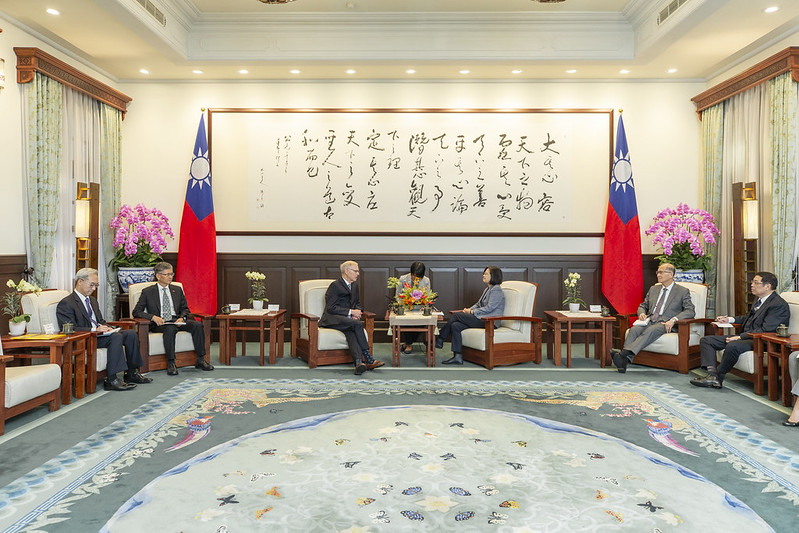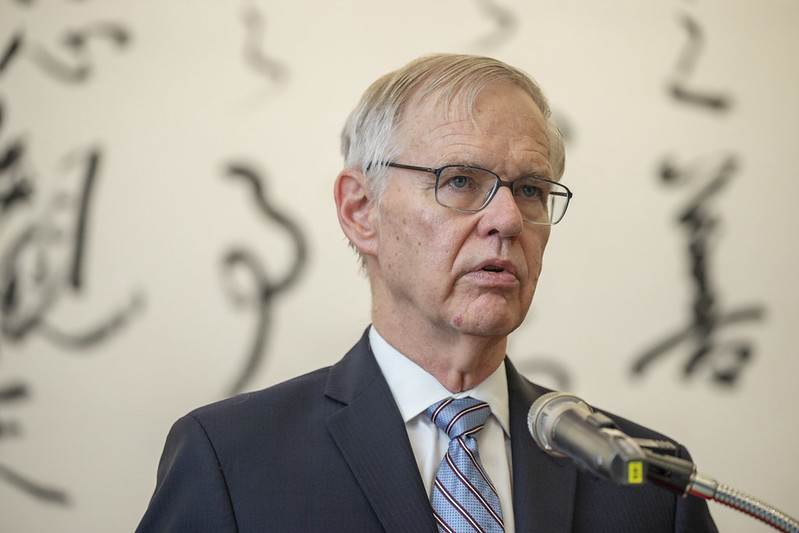News & activities
 News releases
News releases
While meeting with Dr. Richard Bush, Brookings Institution Chen-Fu and Cecilia Yen Koo Chair in Taiwan Studies, on the morning of October 31, President Tsai Ing-wen stated that we regret that the Chilean government has announced the cancelation of the APEC Summit. She detailed her instructions to all government offices that although the summit cannot be held, the cooperation that Taiwan is advocating for should still take place through multilateral ministerial-level dialogues. Regardless of whether the summit is held, Taiwan must continue to actively participate in international affairs.
A translation of President Tsai's remarks follows:
Dr. Bush just led a delegation to Taiwan this past June, and now, less than six months later, I am delighted to welcome my old friend for another visit. Every time we meet, Dr. Bush gives us valuable insights about Taiwan-US relations and regional development.
Since his first visit to Taiwan over 40 years ago, throughout his distinguished career, Dr. Bush has always been deeply concerned about Taiwan-US relations. This year marks the 40th anniversary of the Taiwan Relations Act, and Dr. Bush is very clear about the developments in that relationship. And I believe he will agree that over the past three years, the Taiwan-US partnership has become closer and deeper.
This year, for instance, we have had many breakthroughs in Taiwan-US cooperation. That includes the first Civil Society Dialogue on Securing Religious Freedom in the Indo-Pacific Region in March, the first Indo-Pacific Democratic Governance Consultations in September, and the first Pacific Islands Dialogue this month.
These events have all enhanced mutual Taiwan-US understanding, and strengthened regional relationships. And under the Global Cooperation and Training Framework, Taiwan and the United States have held 21 workshops to date, fostering deeper cooperation on issues of common concern.
Over the past few months, the US Congress and executive branch have voiced strong support for Taiwan's international participation. Yesterday, the US Senate unanimously passed the TAIPEI Act. Today, we learned that the US House Committee on Foreign Affairs also passed the House of Representatives version of that Act.
I want to thank Congress for its bipartisan support. This support is a recognition of our longstanding commitment to democracy, and our efforts to maintain the peaceful, stable, and prosperous status quo in the Indo-Pacific region. We will continue to work and maintain close communication with the US executive and legislative branches to further bolster our partnership.
China's rise and expansion continue to challenge free, democratic values and the world order. The Republic of China (Taiwan) is located on the strategic forefront of the Indo-Pacific region, and we are the first line of defense for democratic values. As an important member of the region, we will honor our international responsibilities. We will not act provocatively or rashly, and we will ensure that the peaceful and stable cross-strait status quo is not unilaterally changed. At this time of great challenges, I want to speak on behalf of the 23 million Taiwanese people to thank our ally the United States for this concrete show of support.
On the other hand, we regret to hear that the Chilean government has announced the cancelation of the APEC Summit. APEC is an important international platform for economic dialogue, and it is the most important international organization that Taiwan participates in. We ask that APEC members work together to find remedial measures, so that members have the opportunity to demonstrate their achievements over the past year.
This morning, I instructed all government offices that although the summit cannot be held, the cooperation that Taiwan is advocating for should still take place through multilateral ministerial-level dialogues. Especially in regards to "digital opportunities," a concept APEC has long promoted, Taiwan must demonstrate its capabilities and make contributions. Regardless of whether the summit is held, Taiwan must continue to actively participate in international affairs.
I want to thank Dr. Bush for his longstanding concern and support for Taiwan, and for his efforts to promote progress in Taiwan-US relations. I believe Dr. Bush has more friends and admirers in Taiwan than anyone else in US scholarly and think tank circles. I look forward to exchanging ideas with you, and hope you will continue to give Taiwan your valuable suggestions.
In his remarks that followed, Dr. Bush started by thanking President Tsai for taking time to receive him, and stated that it is always good to be here in Taipei. He stated that he first came to Taiwan 44 years ago, and started his career looking to be a China specialist, he said, but he ended up focusing his efforts on Taiwan and its relations with mainland China. He felt very lucky that he made that change because it gave him the opportunity to learn a great deal. He also expressed hope that he has made a small contribution to US understanding of Taiwan and US relations with Taiwan.
Dr. Bush pointed out that since the 1990s, we entered an era where the Taiwanese people had a seat at the table. What is important for the United States is the policies of elected leaders, he said, and he was pleased that in the last decade, there has been a lot of overlap and convergence in Taiwan and US policies. He also expressed confidence that going forward, the US relationship with Taiwan will be sustained and will improve and be fruitful.












